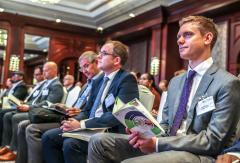ENOC And Energy Institute’s Forum Highlights Importance Of HSE And Sustainability In Energy Sector

ENOC Group and Energy Institute (EI) successfully concluded the second HSE and Sustainability Forum, that gathered researchers, academia, industry and regulators.
Over 100 experts from around the world discussed over three days how companies can become key players in the regional energy industry by fostering operational excellence, governance and embedding a culture of world-class EHS standards to ensure that employees, contractors, communities and assets are protected.
Key speakers included H.E. Ahmad Buti Al Muhairbi, Secretary General, Dubai Supreme Council of Energy, H.E Saif Humaid Al Falasi, CEO of ENOC Group, Jamal Zaal, Vice President, Corporate Health, Safety, Sustainability and Environment, Dubai Airports, Andrew Jackson, Her Majesty’s Consul General, British Embassy Dubai, Ms. Louise Kingham OBE, FEI, Chief Executive, Energy Institute, Thomas A H Pols, Health & Safety Manager Middle East & North Africa, Royal Dutch Shell, and Dr. Eng. Waddah Ghanem, Senior Director Sustainability, Operational and Business Excellence, ENOC.
H.E Saif Humaid Al Falasi, Group CEO, ENOC, said: “We are pleased to work with Energy Institute to organise the second Middle East HSE and Sustainability Forum; a platform we believe has brought together research and academic communities with industry regulators to shed light on EHS, sustainability, energy efficiency challenges and opportunities that are facing the energy sector in our region.”
“The Middle East HSE and Sustainability Forum serves as a catalyst to promote best practices in EHS, which is also central to achieving Dubai’s 2030 Integrated Energy Strategy, added Al Falasi.
This year’s forum included a series of roundtable discussions. Some of topics discussed at the forum included: The value of adopting international HSE good practices, smart safety systems, improving health and safety performance, the future of HSE in the digital world, occupational safety versus process safety, the industry’s role in delivering energy safely, managing health hazards and reducing their impact on workers’ wellbeing and the importance of retrofitting in reducing Dubai’s energy demand’.


